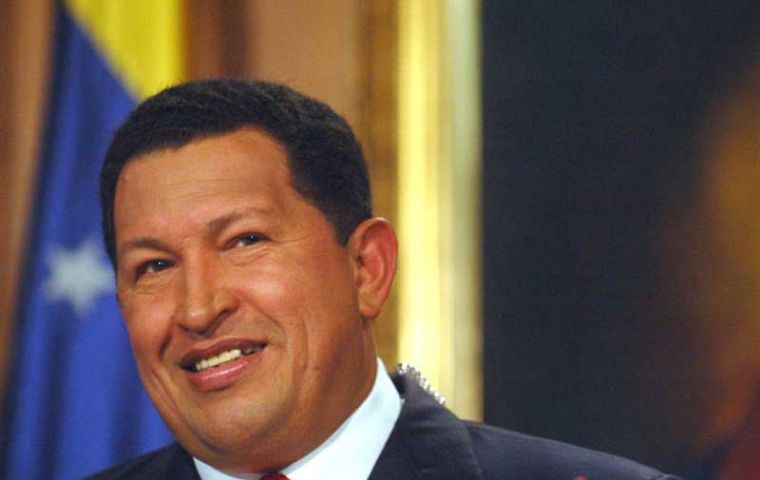MercoPress. South Atlantic News Agency
Venezuela reacts angrily to US report on cocaine smuggling and corruption
 President Chavez described the report as “political blackmail”
President Chavez described the report as “political blackmail” Venezuela said United States must stop publishing “interventionist” reports criticizing the country’s drug interdiction practices in order for relations to improve. A report released Monday by the US Government Accountability Office, GAO, amounts to “political blackmail” warned the Venezuelan Foreign Affairs ministry in an e-mailed statement
GAO detailed the deteriorating relationship between US and Venezuelan drug enforcement agencies and the increased flow of Colombian cocaine across Venezuelan territory.
“Cocaine shipments over Venezuelan borders more than quadrupled between 2004 and 2007 to 260 metric tons. Rampant government corruption and lax enforcement make it easier for smugglers to ship drugs into Venezuela from Colombia and load it onto planes at clandestine air strips or use boats bound for the US, Africa and Europe” indicated the report.
“The government of the Bolivarian Republic of Venezuela confirms that the normalization of political relations with the United States is subordinated to the cessation of this intolerable practice,” the ministry said Tuesday.
The statement comes weeks after Venezuela and the US agreed to send ambassadors to each others’ capitals for the first time since Venezuelan President Hugo Chavez expelled the U.S. envoy in Caracas in September.
GAO, which is an investigative arm of US Congress, said that US government officials have seen a 63% increase in suspicious air traffic out of Venezuela from 2004 to 2007, with most flights heading to Hispaniola and Central America. Venezuela’s National Anti-Drug Office reported that in 2008 it destroyed 325 secret runways.
The GAO report also said that files obtained last year from the computer of a deceased member of the Revolutionary Armed Forces of Columbia, or FARC, show that ties between the Colombian guerrilla group and the Venezuelan government are “well established.”
“Venezuela may have provided the FARC with 300 million USD, along with medical care and weapons”, the report said.
“The GAO would make better use of US taxpayer money by concentrating its efforts on dismantling the networks of corruption that make its own country a paradise for drug dealers and gangs” added the ministry.
In related news President Chavez said his government is reviewing its relations with Colombia because Bogotá is in talks with the US on increasing the US military presence at its bases.
Chavez said that the talks aimed at basing more US troops in neighbouring country “obliges us to review our relations” with Bogotá. Venezuela is being forced to make the decision “because they're opening the doors to those who constantly attack us,” Chavez said, according to the state-run Bolivarian News Agency.
Most details of the negotiations are secret, but Colombian President Alvaro Uribe has said his government is aiming to complete an agreement for US troops to be able to use at least three Colombian bases. It remains unclear how soon the agreement is to be signed.
There was no immediate reaction from the Colombian government. Chavez has had diplomatic disputes with US allied Colombia in the past, but the two neighbours have repeatedly smoothed over their conflicts. Chavez said having more U.S. troops in Colombia would pose a threat to Venezuela.
“The Yankees want to set up four more military bases in Colombia” Chavez said. “Of course they use euphemisms and say they aren't Yankee bases, but rather Colombian bases and that they could come. They're going to be there permanently”.




Top Comments
Disclaimer & comment rulesCommenting for this story is now closed.
If you have a Facebook account, become a fan and comment on our Facebook Page!